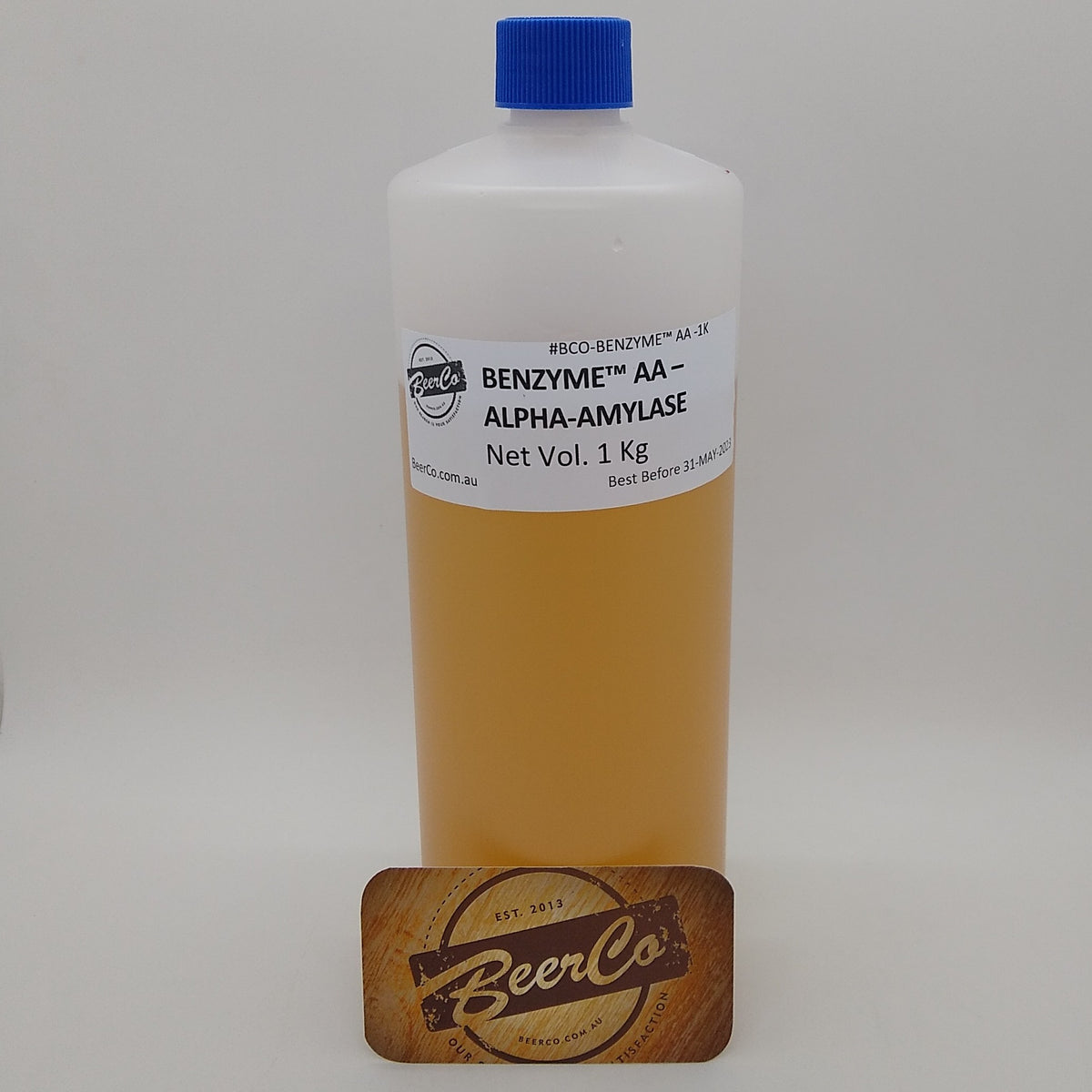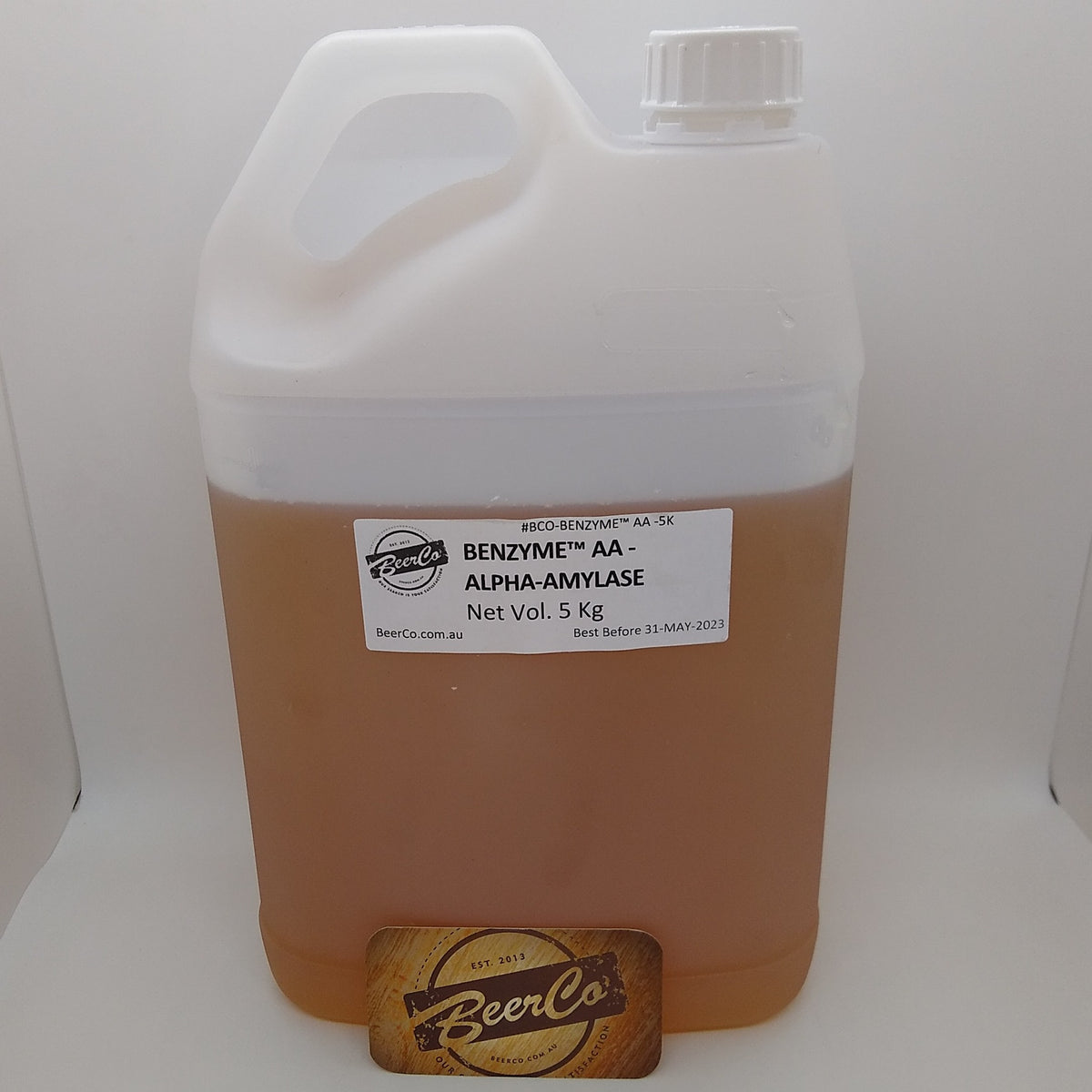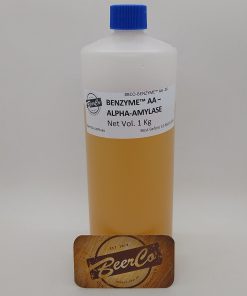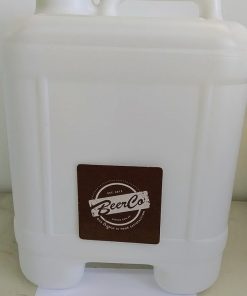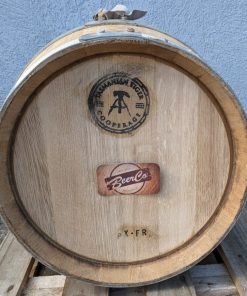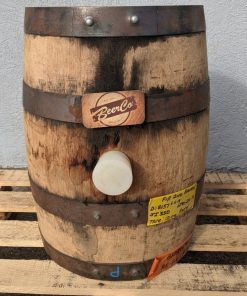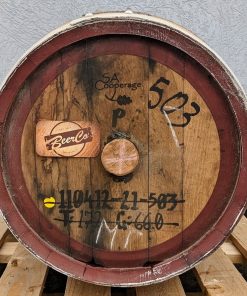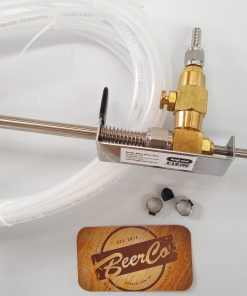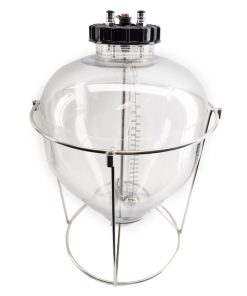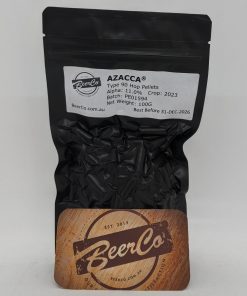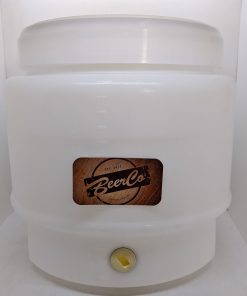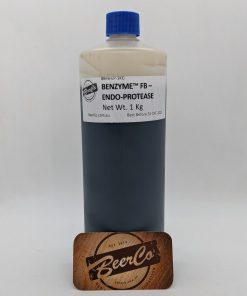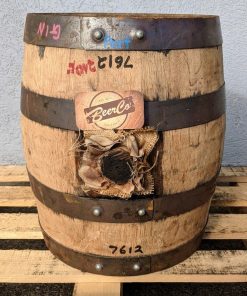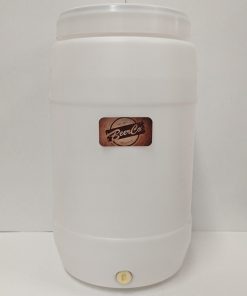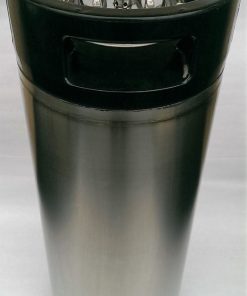Benzyme AA | Alpha Amylase novozymes
$ 30,95 $ 18,57
Benzyme AA – Alpha Amylase is a high-performing thermostable amylase. Benzyme AA is a cost-effective solution for adjunct liquefaction and increased brewhouse capacity.
In this product the key enzyme activity is provided by endo-amylase that hydrolyzes (1,4)-alpha-D-glucosidic linkages in starch polysaccharides
PRODUCT CHARACTERISTICS/PROPERTIES
Component name: Alpha-amylase
Activity: 240 KNU-S/g
Color: Amber
Physical form: Liquid
Approximate density (g/ml) 1.27
Color can vary from batch to batch. Color intensity is not an indication of enzyme activity.
Pack Sizes:
- 1 Kg Bottle
- 5 Kg Jerry Can (SAVE 20% OFF 1KG Price)
- 25 Kg Canister novozymes Termamyl® SC DS
Key Benefits:
Increased adjunct inclusion
Adjuncts like corn, rice and sorghum starch have high gelatinization temperatures. Malt α-amylases become inactive at these temperatures. The result is inconsistent with starch degradation. That limits the proportion of these adjuncts you can include in your beers. This thermostable product delivers consistent liquefaction at high temperatures. That means you can increase adjunct inclusion in your beers.
Increased brewhouse capacity
The exceptional power of this liquefaction product allows for thicker mashes without the risk of high viscosity. You can use this versatility to increase the capacity of your brewhouse.
Consistent extract yield
A liquefaction step that uses only malt enzymes can lead to inconsistent starch degradation. This in turn leads to inconsistent extract yield. This heat-stable product delivers consistent liquefaction at high temperatures.
Flexible high gravity brewing
This product delivers the viscosity reduction you need to run your process at high grist. That allows you to reap the benefits of high-gravity fermentation. These include reduced energy and water consumption.
Potential energy savings
Decoction mashes are typically heated to a peak of 100°C.
That’s partly so the physical action of boiling can break down starch molecules. This thermostable product degrades starch at 90°C to allow lower peak temperatures in your decoction vessels. Handling decoction mashes at lower temperatures leads to potential energy savings.
Brewing Application sheet
Cost-effective cereal cooking
For high-gelatinizing adjuncts, a separate cooking step during mashing is required to secure sufficient gelatinization and liquefaction. Due to lower stability of malt α-amylases at the gelatinization temperatures of corn, rice and sorghum starch, a liquefaction step that uses only malt enzymes can lead to inconsistent starch degradation. This can result in several process and quality issues such as lower yields, less efficient wort separation and a haze increase in the final product.
BeerCo Alpha Amylase products are heat-stable amylases that offer easy and consistent liquefaction at high temperatures, providing many benefits and preserving full malt enzyme potential for the main mashing process.
Benefits
● Faster and more consistent liquefaction
● Lower mash viscosity, resulting in easier wort production
● No risk of resistant or retrograded starch formations, or insufficient saccharification
● Reduced processing costs through more efficient liquefaction, increased yield of up to 1%
● Improved flexibility of use of various cereal grain adjuncts
● Reduced energy consumption due to lower temperatures when handling decoction mashes
Usage
Dosage
The amount of Termamyl® added during mashing-in depends on adjunct material and quality.
| Dosage [kg/ton of adjunct] | Ca2+ requirements | |
| BeerCo Alpha Amylase | 0.15–0.25 | no dependency |
Rules of Thumb for Dosage Guidance
kg/ton = g/kg
Typical density of enzyme is 1.15 g/ml
Using the above, the 0.15 – 0.25 kg/t recommended dosage becomes 0.13 – 0.22 ml/kg grist
Nitrogen
Using higher amounts of adjuncts (>20%) may result in worts with insufficient free amino nitrogen (FAN). This can be counteracted by using a protease such as Neutrase® 0.8 L in the malt mash to extract more nitrogenous compounds from the malt.
Inactivation
Benzyme AA – Alpha Amylase can be deactivated during a typical wort boil.
Product data
- Declared enzyme – Thermostable α-amylase
- Catalyzes the following reaction: Hydrolyzes 1,4-α-glucosidic linkages in amylose and amylopectin. Gelatinized starch is rapidly broken down into soluble dextrins and oligosaccharides
- Declared activity 240 KNU_S/g & 480KNU_S/g
- E.C/ I.U.B. no.: 3.2.1.1
- Physical form – Brown liquid
- Production method – The enzyme product is manufactured via fermentation of a microorganism not present in the final product. The production organism and enzyme effectiveness are improved by means of modern biotechnology
- Density – 1.25 g/ml
Stability
Shelf life is up to 2 years if stored chilled below 10C. We recommend storage in the refrigerator.
Safety, handling and storage
Safety, handling and storage guidelines are provided with all products.
| Size | 1 Kg, 5 Kg |
|---|
Fast shipping and professional packing
We offer a wide range of shipping options due to our long-running partnerships with UPS, FedEx and DHL. Our warehouse staff are highly trained and will package your items according to our precise and precise specifications. Before shipping, all goods are thoroughly inspected and securely secured. Every day we ship hundreds of packages to our customers from all over the world. This is a sign of our commitment to be the largest online retailer worldwide. The warehouses are located situated in Europe as much as they are in USA.
Note: Orders containing multiple items will have a different processing period for each item.
Before shipping the items, our staff will carry out an extensive inspection of the products you have ordered. The majority of orders are delivered within 48 hrs. The delivery time should be between 3-7 working days.
Returns
We don't manage the stock in our factory and warehouse. Actual stock levels may fluctuate at any moment. Be aware that it's possible that your order will be out of stock after you have placed the order.
Our policy is for 30 days. Unfortunately, if 30 days have passed from the date you purchased the product, we are unable to offer you a return or exchange.
The item must not be used, and it must be in the original packaging. It must also be in the original packaging.
Related products
Brewing Aids
Equipment
Brewing Aids
Equipment
Equipment
Equipment
Equipment
Brewing Aids
Equipment
